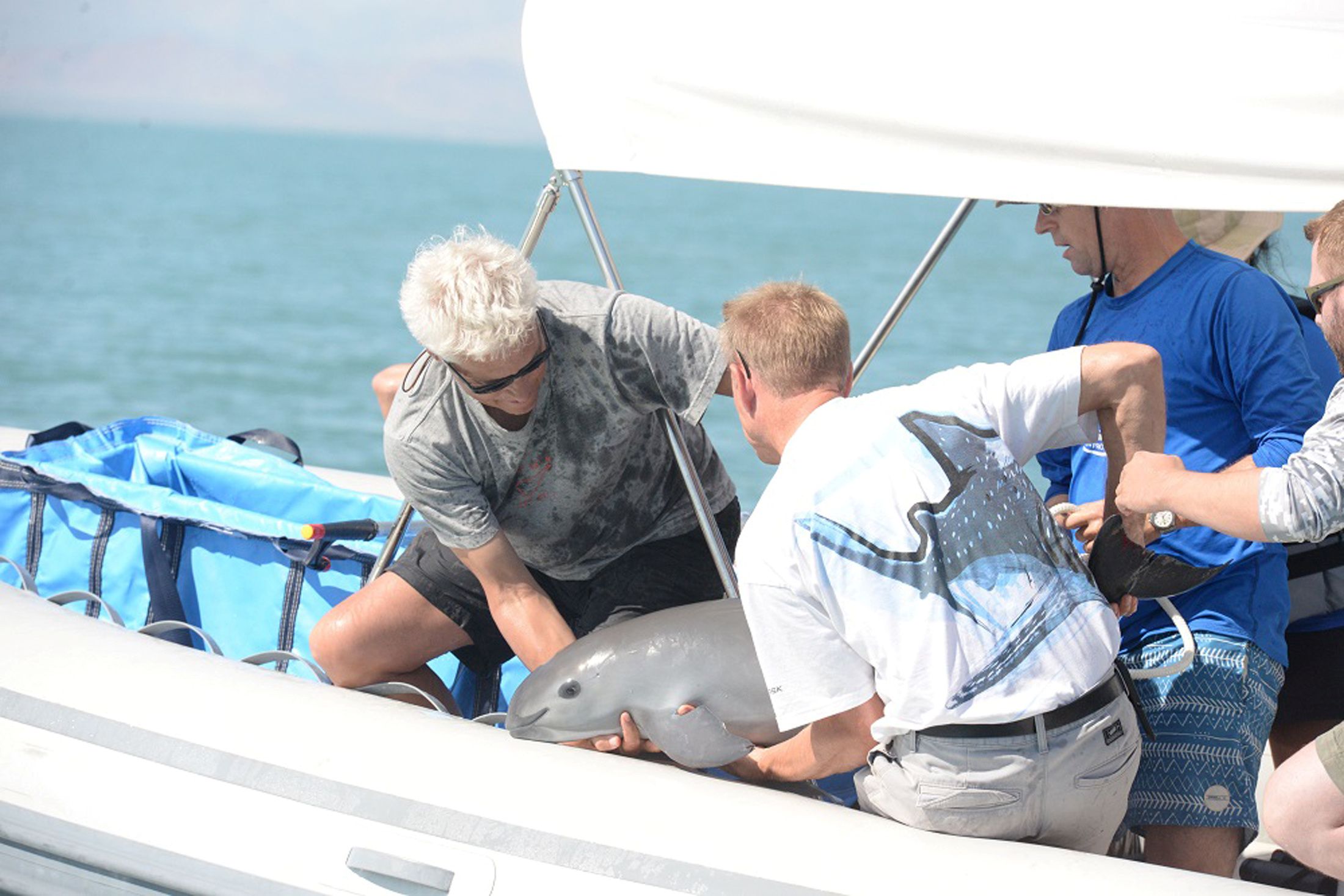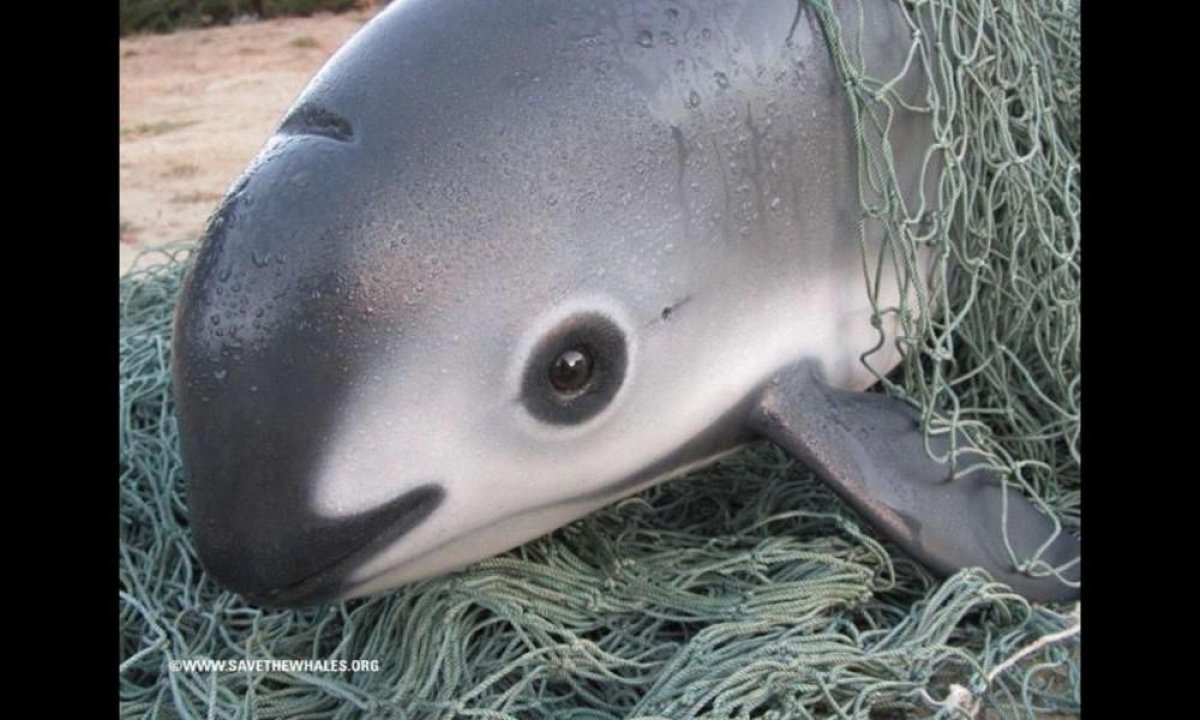
An attempt to rescue a vaquita porpoise, one of the most endangered animals in the world, failed when the animal, which had been placed in protected captivity on Saturday, died.
Only an estimated 30 vaquita porpoises are left in the world. The marine mammal is distinguished by dark coloring around its eyes, which lend it the nickname Panda of the Sea. In an effort to save the species, the Mexican government has launched a controversial program to take as many vaquita as possible out of the Northern Gulf of California (their only remaining habitat in the wild) and place them into a protected marine reserve.
The vaquita in question was the first to be captured by Vaquita Conservation, Protection, and Recovery and released into a floating pen off the coast of San Felipe, Mexico. Veterinarians observed the porpoise growing weaker within hours after being released into the pen. VaquitaCPR decided to release it and, when that failed, to save its life, but the vaquita continued to decline. Mexico's environmental secretary, Rafael Pacchiano, announced the death Sunday afternoon.
"A mature female vaquita, not pregnant or lactating, had been caught and transported successfully late in the afternoon on Saturday in the Northern Gulf of California and was taken to a specially modified floating sea pen known as El Nido, or the Nest," VaquitaCPR said in a statement.
"From the moment of capture, the vaquita was under constant care and observation for its health and safety," the statement continued. "Marine mammal veterinarians monitoring the vaquita's health noticed the animal's condition began to deteriorate and made the determination to release. The release attempt was unsuccessful and life saving measures were administered. Despite the heroic efforts of the veterinary team, the vaquita did not survive."
A glimpse into #VaquitaCPR field operations, which are continuing today. @VaquitaCPR @zoos_aquariums @TMMC https://t.co/5VUpes5dLN
— Vaquita CPR (@VaquitaCPR) October 27, 2017
The group of international scientists announced they'd be conducting a review to determine exactly where things went wrong. VaquitaCPR operates as the last line of defense between the vaquita and extinction. The VaquitaCPR team has had its critics, some of whom wonder if the members prioritize risky operations at the expense of efforts like trying to make the vaquita habitat itself safer. There's evidence that some species on the brink of extinction are better served trying to breed in the wild, not in captivity, and captive breeding-and-release programs may become more popular as a safe means of conservation.
But in the wild, the vaquita is threatened by illegal fishing, which targets black market species that coexist with the vaquita. The endangered porpoises often end up drowning in fishing nets. In the end, supporters of VaquitaCPR feel that the risk of all remaining vaquita being killed through illegal fishing is greater than the risk of trying to capture and move them.
"With so few vaquitas left, this consortium of international conservation and animal care experts was assembled at the request of the Mexican government and scientific community to develop an unprecedented rescue and relocation operation that is widely recognized as the best hope for vaquitas' existence," the VaquitaCPR statement continued. "The risk of losing a vaquita during field operations was always acknowledged as a possibility, but it was determined that it was unacceptable to stand by and watch the vaquita porpoise disappear without a heroic attempt at rescue."

In Germany they've come up with the word verschlimmbesserung to describe that thing where you try to fix something and only end up making it worse, but in the United States we have a somewhat flimsier grasp of the concept. The past few years have seen an unfortunate number of animal casualties at the hands of bystanders who might have been well-meaning but really should have just left well enough alone.
For instance, there was the bison calf in Yellowstone National Park that had to be euthanized after tourists put it in their car, believing that it was too cold. Last year, the National Oceanic and Atmospheric Administration was driven to the point of releasing a memo titled "No Selfies With Seals," because breathless selfie-takers were so overcome by the sight of seal pups that the animals were in danger of actually being smothered to death.
Hopefully, the clearly well-meaning efforts to save the vaquita porpoise will end up benefiting this nearly extinct species.
Uncommon Knowledge
Newsweek is committed to challenging conventional wisdom and finding connections in the search for common ground.
Newsweek is committed to challenging conventional wisdom and finding connections in the search for common ground.
About the writer
Kastalia Medrano is a Manhattan-based journalist whose writing has appeared at outlets like Pacific Standard, VICE, National Geographic, the Paris Review Daily, ... Read more
To read how Newsweek uses AI as a newsroom tool, Click here.








